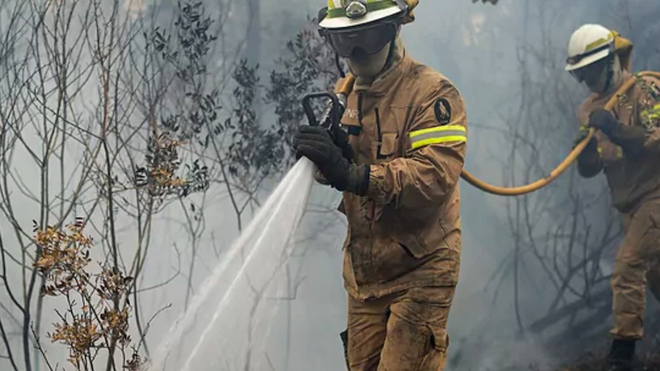Southern Europe is on fire and the thermometers continue to rise. “A small oversight can end in a huge tragedy,” Portuguese Prime Minister Antonio Costa said yesterday, while the entire country is in “maximum or very high danger of fire,” according to the Portuguese Institute of the Sea and the Atmosphere.
This Friday, more than 2,600 firefighters supported by 11 helicopters and 790 vehicles are fighting 41 fires, several of which have been active for more than a week, because extreme heat and wind make it difficult to extinguish them. Those of Pombal, Ponte da Barca and Baião are the ones that most concern the authorities. The record temperature, 44 degrees, was broken in Almeirim, a town north of Lisbon. There, the heat wave has not given up for more than a week. A report from the newspaper Público yesterday drew a black scene, of ashes, smoke and empty buckets of water, with which the population tried to put out the fire. The journalist recounted how, when summer came, the feeling of alertness took over the population. Any column of smoke arouses the fear that it will come again, a fire.
According to data from the Institute for the Conservation of Nature and Forests, as of Thursday night, 30,143 hectares of land had already been burned, a figure that exceeds the total area burned last year and is also the highest figure since 2017. year of the tragic fire of Pedrógrao Grande. These days the memory of devastating fires that ended the lives of 64 people returns to memory. More quietly, almost without grabbing headlines, Portugal has registered up to 238 deaths related to extreme heat since July 7; the most affected are the elderly, children, and people with previous pathologies.
The country has extended the state of contingency – which includes, among other measures, the prohibition of burning stubble, work in forest areas or the use of fireworks. until next Sunday in the face of adverse weather forecasts. Costa defends himself against the criticism of those who accuse him of not having sufficient means, saying that “the answer is not more means, but more care”, appealing to citizen awareness. Civil Protection has already warned that in more than half of the fires is the hand of man, intentionally or accidentally. A report in the newspaper Expresso collected that the Judicial Police has collected, since 2004, up to 700 profiles of arsonists in the country. They are often young men, coming from dysfunctional families, with a low level of education, risk factors such as alcohol consumption and behaviors that are often repeat offenders.
Meanwhile, in France, two fires in the Gironde department, with its capital in Bordeaux, have burned more than 7,300 hectares. On Thursday afternoon, more than 4,000 people from Cazaux had to be evacuated, in addition to the more than 6,000 evicted in the Bassin d’Arcachon area, especially in campsites near the coast.
A thousand firefighters, a hundred vehicles and half a dozen planes are working on the fires in the Gironde and the Landes, to the south. Precisely in the Gironde, fireworks, both public and private, were also prohibited on Thursday, the French national holiday.
“Global warming has direct impacts on civil protection. It is the firefighters, security, who see these effects on a daily basis. The consequences are now, not in 2030,” lamented Grégory Allione, president of the Federation, in a television interview. National Firefighters.
In Morocco, firefighters and soldiers were also trying to control four fires in the north of the country, Fouad Assali, director of the Center for Forest Climate Risk Management, told Agence France Presse.
The fires, favored by violent winds, broke out in the provinces of Larache, Uezán, Tetuán and Taza, Assali specified. A small town in the Alcazarquivir region was destroyed by the flames. More than a thousand hectares of forest have burned in the provinces of Larache and Uezán, according to a provisional balance.
Also in Greece, firefighters are fighting amid strong winds to extinguish fires in the capital region of Attica and on the island of Crete, where local authorities have ordered the preventive evacuation of some districts.
These four countries are, according to data from Copernicus, the Earth Observation Program of the EU, those that register a greater risk of fires.
Conforms to The Trust Project criteria
















